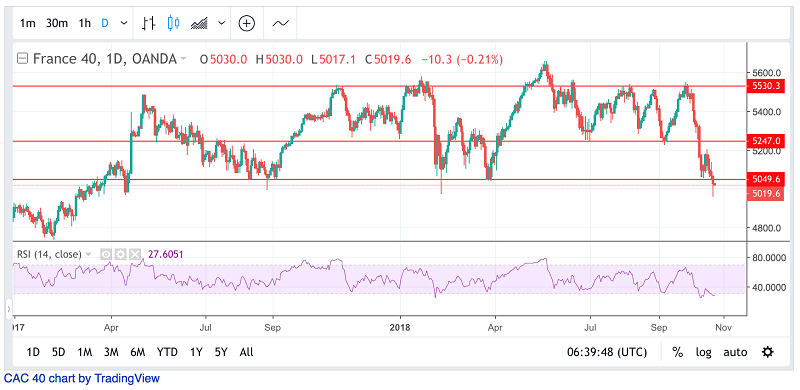While it may seem that the month of October is statistically the month in which the index parisian ends, less in the red, the story also shows that when the month of October is bearish, it is highly. During the subprime crisis, the month of October 2008 saw the Cac 40 fall by more than 13 %.
The flagship index for French fell yesterday under the symbolic threshold of 5,000 points for the 1st time this year in a volume of trading important, losing 10 % since its peak a month ago and 12 % from its year-high reached in may of last year. At the lowest level since march, 2017, yesterday was the 9th session of decline in 10 days for the CAC 40.

Full season of results, the French companies disappoint investors, particularly in their perspectives, suggesting that fears of a global economic downturn are well founded.
The context of the geopolitical tensions between Washington and Beijing, or between Saudi Arabia and the West, also weighs on sentiment, not to mention the unprecedented decision of the European Commission, which has rejected yesterday the budget Italian.
The Italy must present a new budget in the next 3 weeks
The rejection of the draft budget 2019 Italy is an unprecedented step against a country of the euro zone but the European Commission has argued that the goals of the country in terms of deficit and growth constituted a significant threat to the economic stability of the countries of the Euro Area. Italy now has 3 weeks to submit a revised budget that does not go ” against its commitments “.
This decision of the European Union intervenes in a context of economic and political problems growing in Italy. Indeed, the coalition, formed by Matteo Salvini – minister of the interior Italian, and Luigi Di Maio – vice-prime minister of italy, has been largely elected on the promise to redefine the relations of Italy with Europe, and it could, therefore, consider this release as a kind of victory.
In order to exist, the current Italian government has need of enemies, and Europe has played this role to perfection with its rules of sovereignty and its austerity measures and restriction. Following the decision of the Commission, the vice-prime minister of italy said on Facebook : “This is the first budget Italian that the EU does not like. I’m not surprised. This is the first budget Italian that has been done in Rome and not in Brussels “.
Italy – A growing risk for the european markets, which also weighs on the Italian economy
Beyond Rome and Brussels, the investors are also influencing the financial markets and have recently sent the spreads in bond Italian to unsustainable levels.
This situation could negatively impact the economy of the country, even as the two populist parties in power are always considered to be the leaders that would make Italy a country that would no longer be dominated by spreads…
The spread can increase even when lending rates are falling and the widening of the spread between Italian debt and German indicates that investors think that the debt is in Italian public is more risky than before relative to the German debt is still considered safe.
Fears of a spread to the rest of the Euro Zone impact the market sentiment
This widening of the spread is a representation of the investors ‘ concern vis-à-vis the prospects for a country and weighs in on the european markets and the Euro, as fears of a spread to the rest of the Euro Area.
In the end, what worries investors is the possibility of an exit from the Euro Zone and it is a significant question especially when we see how the negotiations around the release of the 2nd european power happen.
Last Friday, the rating agency Moody’s has decided to cut the rating of Italy from “Baa2” to “Baa3″ – the level just above the category speculative, which means that the risk of non-repayment is high. For Moody’s, ” the project of the budgetary measures and economic of the government do not constitute an agenda of coherent reforms that can help solve the problems of disappointing growth “.
Italy would like to really remain in the Euro Zone ? The Italian government and the Italians want the same thing ?
The speech of the Italian government and its actions appear to be sometimes conflicting.
After having based his campaign on the flaws of the single currency and the many disadvantages linked to the side of a supra-national Commission and other european bodies, the current government says it does not want to leave Europe or the Euro.
But while the minister of economy and finance Italian, Giovanni Tria, many struggled to convince investors that the Italian economy was healthy, the deficit target of the adopted budget is higher than what is acceptable to the Europe especially to one of european countries most in debt. According to statistics from Eurostat, Italy would be the country with debt the most important of the European Union after Greece, with a debt that exceeds 130% of GDP at the end of the 1st quarter of 2018.







